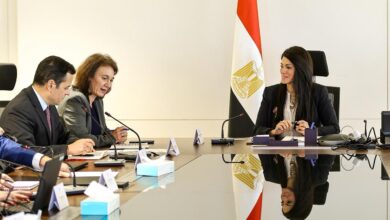
Egyptian President Abdel Fattah al-Sisi said on Saturday he was committed to pushing through the reforms necessary to turn the economy around and cut public debt, days after Egypt negotiated a US$12 billion loan program with the International Monetary Fund.
The IMF said on Thursday it had agreed in principle a three-year facility to support comprehensive government reforms.
But the deal is subject to final approval by the IMF executive committee, and disbursement is linked to progress on a variety of reforms. They include subsidy cuts, the introduction of value added tax (VAT) and a shift to a more flexible exchange rate regime.
Successive governments have shied away from cutting subsidies, a politically explosive issue in a country where tens of millions rely on state-subsidized bread. Efforts to reduce the aid in the 1970s led to bread riots.
Speaking at the opening of a factory in Alexandria, Sisi said that experience would not deter him from pushing through painful reforms.
"The first effort at reform came in 1977, and when it was not accepted by the citizens, all the governments hesitated to make reform efforts, afraid of the reactions," Sisi said.
"It is not only you who will judge me. God will also judge and so will history … All the difficult decisions that many hesitated to take over many years, that they were afraid to take, I will not hesitate to take for one second."
In 2014, Egypt began a program to eliminate energy subsidies over five years. The government on Monday announced new increases in electricity prices.
A VAT bill is in parliament, where it has faced significant opposition from lawmakers concerned about the impact on prices in a country where headline inflation is at 14 percent.
Sisi said that repeated wars over the decades had set back Egypt's economic development and that the uprising that ended Hosni Mubarak's 30-year rule had shaken the economy.
He blamed terrorist attacks over the decades for holding back tourism and said there was a need to end corruption.
Sisi also said that a bloated public payroll had contributed to the country's deficit and hinted at looming increases in the cost of riding Cairo's underground trains. He also promised that programs were underway to protect the poorest from the impact impending reforms.




